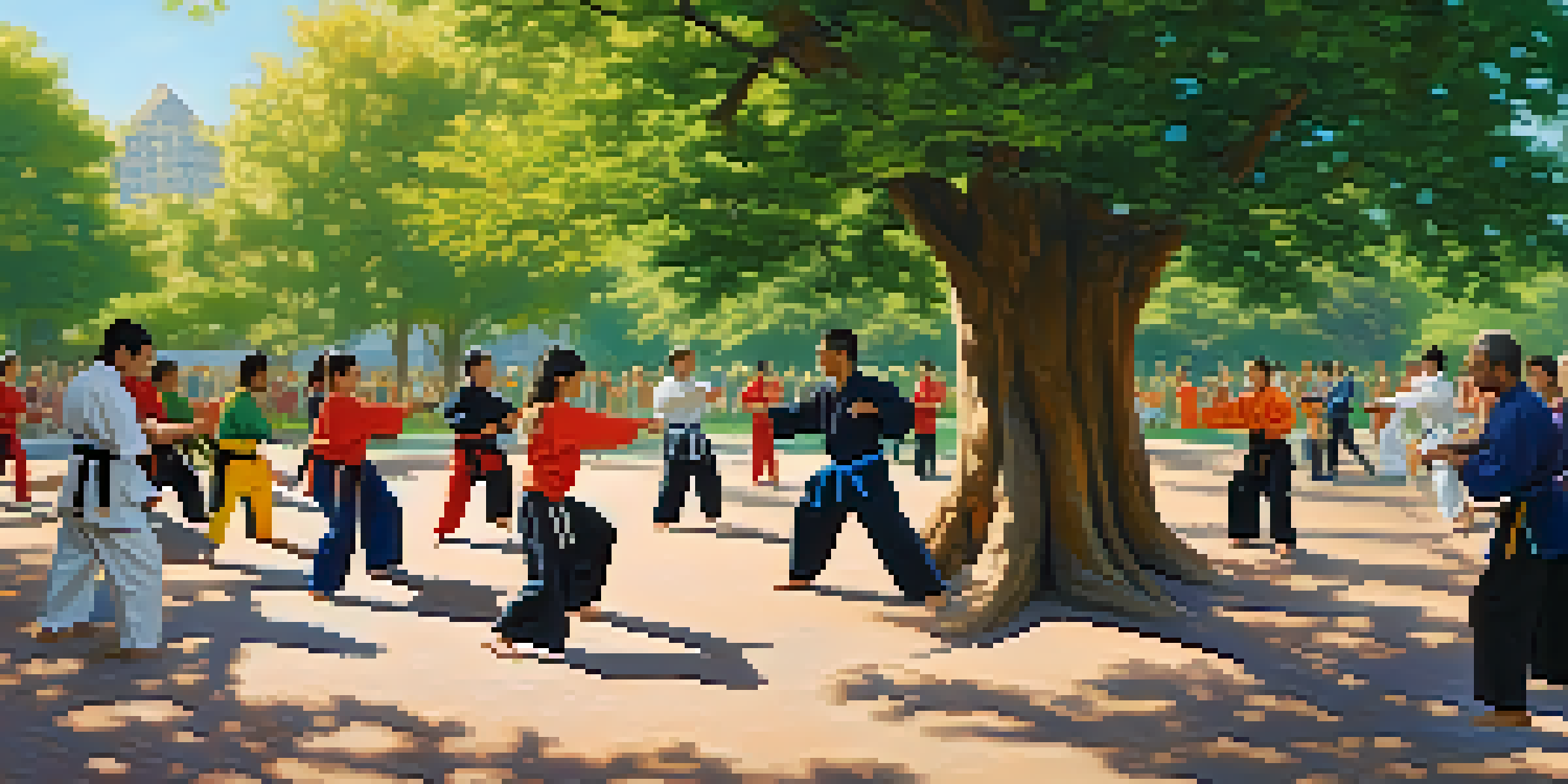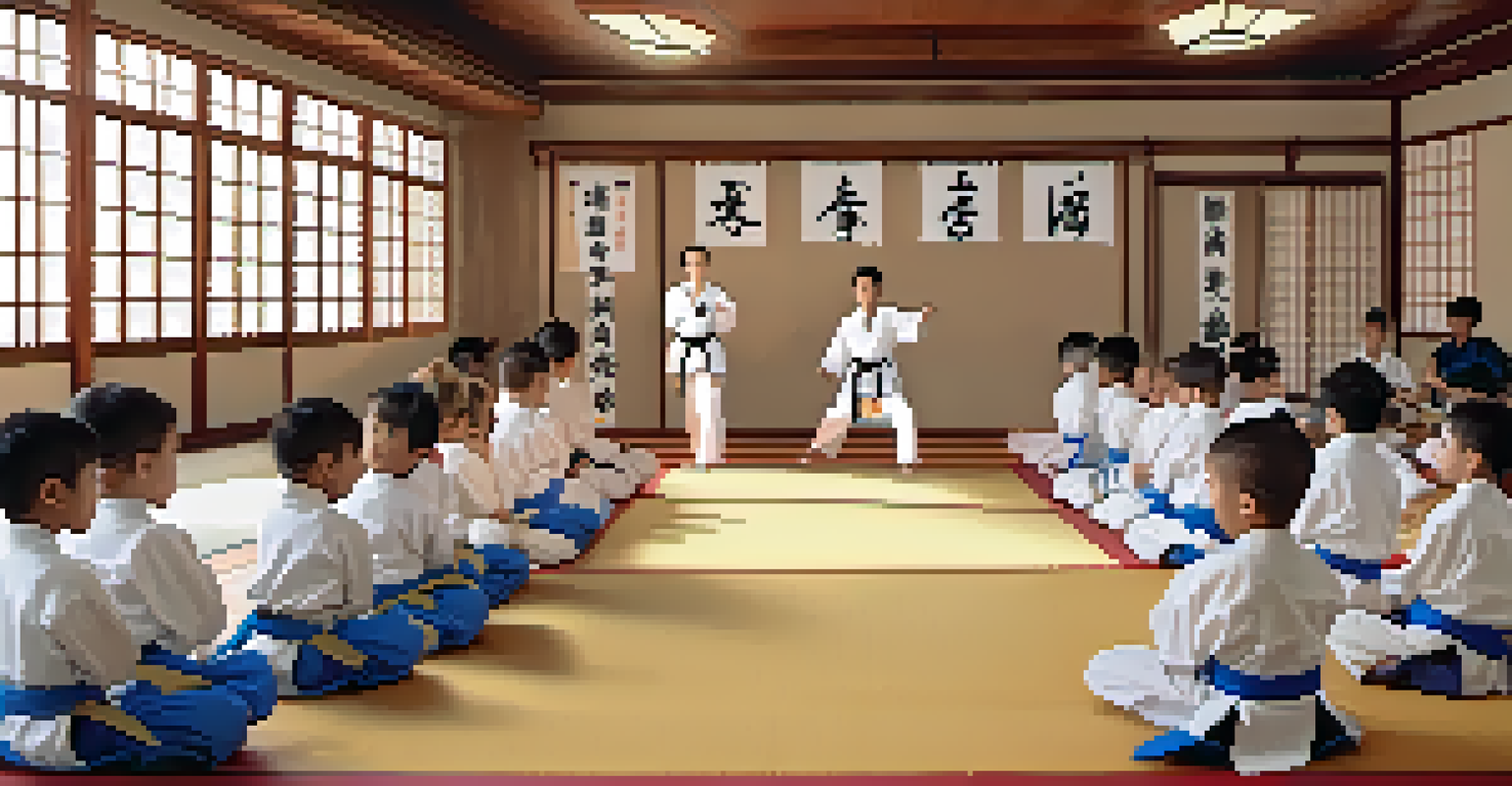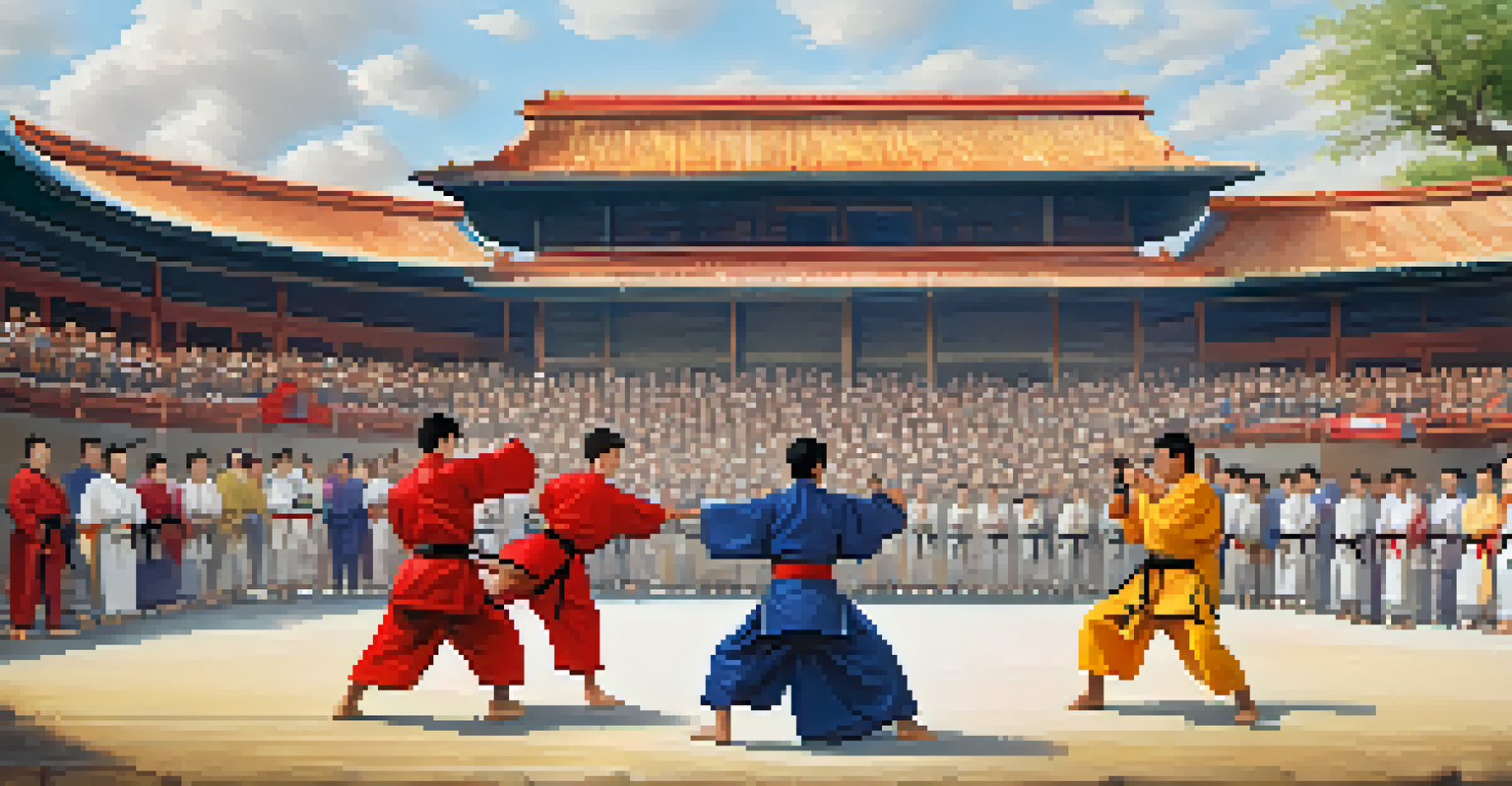The Impact of Martial Arts on Community Engagement Programs

Understanding Martial Arts and Community Engagement
Martial arts encompass various disciplines that combine physical training with mental fortitude. They are not just about combat; they promote values like respect, discipline, and perseverance. When integrated into community engagement programs, these values can lead to stronger social bonds and a sense of belonging among participants.
Martial arts is not about the strongest fighter; it's about the strongest community.
Community engagement is about actively involving individuals in their neighborhoods, fostering collaboration and connection. Martial arts programs can serve as a catalyst for this by bringing diverse groups together. They create a shared space where individuals can learn from each other, breaking down barriers and building friendships.
By introducing martial arts into community initiatives, organizations can tap into the inherent benefits of these practices. This approach encourages physical activity, promotes mental well-being, and nurtures a sense of community, making it a powerful tool for social development.
Benefits of Martial Arts in Community Programs
The physical benefits of martial arts are well-documented, including improved fitness and coordination. However, the mental benefits can be even more profound. Participants often experience increased confidence and self-discipline, which can have a ripple effect in their personal and social lives.

Moreover, martial arts training emphasizes respect and cooperation, essential qualities for fostering community spirit. As individuals learn to work together in classes, they develop mutual understanding and camaraderie. This teamwork can extend beyond the dojo, influencing community projects and initiatives positively.
Martial Arts Build Community Bonds
Integrating martial arts into community programs fosters respect, discipline, and social connections among participants.
In essence, martial arts can serve as a bridge, connecting individuals from various backgrounds. By participating together in training and competitions, community members can build relationships that lead to greater social cohesion and collective problem-solving.
Case Studies: Successful Community Engagement through Martial Arts
Several communities have successfully implemented martial arts programs that demonstrate their impact on engagement. For instance, a neighborhood in Chicago launched a free martial arts class that attracted youth from different backgrounds. Through this initiative, participants not only learned self-defense but also formed friendships and took part in community clean-up events.
The best way to find yourself is to lose yourself in the service of others.
Another example comes from a nonprofit organization that offers martial arts training to at-risk youth. The program not only provides physical training but also life skills workshops, helping participants build resilience. Many of these youth have gone on to mentor others, creating a positive cycle of community involvement.
These case studies highlight how martial arts can address specific community needs, from youth development to crime reduction. They showcase the potential for martial arts to transform lives and foster a sense of belonging and responsibility among participants.
Creating Inclusive Martial Arts Programs
Inclusivity is crucial for community engagement, ensuring everyone feels welcome in martial arts programs. By adapting training to accommodate individuals of all ages, abilities, and backgrounds, organizations can create a more inviting environment. This could mean offering classes specifically for women, seniors, or individuals with disabilities.
Moreover, incorporating cultural sensitivity into training can enhance inclusivity. Understanding and respecting the diverse backgrounds of participants fosters a sense of belonging. This not only enriches the martial arts experience but also encourages participants to contribute their unique perspectives to the community.
Inclusivity Enhances Participation
Creating inclusive martial arts programs encourages diverse participation, breaking down barriers and enriching community experiences.
Ultimately, inclusive martial arts programs can break down barriers and encourage participation from all community members. This diversity can lead to more robust discussions and interactions, further enhancing the community engagement experience.
Role of Instructors in Community Engagement
Instructors play a vital role in the success of martial arts community programs. Beyond teaching techniques, they serve as mentors and role models for participants. Their ability to foster a positive and encouraging environment can significantly influence the overall experience of participants.
Effective instructors are often those who understand the community's needs and actively engage with its members. They can tailor their teaching methods to resonate with participants, making lessons relatable and impactful. This engagement helps create a supportive atmosphere where individuals feel motivated to participate and grow.
In essence, instructors are the heart of martial arts programs. Their dedication to building strong relationships with students not only enhances the learning experience but also strengthens community ties, making the program more effective in achieving its goals.
Challenges in Implementing Martial Arts Programs
While martial arts offer numerous benefits for community engagement, challenges can arise during implementation. Funding is often a significant hurdle, as programs require resources for equipment, facilities, and qualified instructors. Securing financial support can be a complex process but is essential for program sustainability.
Another challenge is overcoming misconceptions about martial arts, which some may view as solely combative. Educating the community about the holistic benefits of martial arts—such as self-discipline, respect, and teamwork—is crucial. This understanding can encourage more individuals to participate and reap the rewards of such programs.
Instructors Are Key to Success
Effective instructors not only teach techniques but also mentor participants, strengthening community ties and enhancing the learning environment.
Additionally, ensuring long-term engagement can be difficult. Programs must continuously evolve to meet the changing needs of the community and maintain interest. By actively seeking feedback and adapting accordingly, organizations can keep participants engaged and invested in their martial arts journey.
Future of Martial Arts in Community Engagement
The future of martial arts in community engagement looks promising, especially as more organizations recognize its potential. With a growing emphasis on mental health and wellness, martial arts can serve as an effective tool for promoting both physical and mental well-being. This dual focus can attract a broader audience and create more inclusive environments.
Technology also plays a role in the evolution of martial arts programs. Virtual classes and online communities can extend the reach of martial arts beyond geographical boundaries, allowing more individuals to participate. This accessibility opens the door for innovative engagement strategies that can further strengthen community ties.

As we move forward, it’s essential to continue evaluating and adapting martial arts programs to meet community needs. By embracing new ideas and fostering connections, martial arts can maintain its relevance and impact on community engagement for years to come.